Radio Replies
Third Volume
The Rev. Dr. Leslie Rumble, M.S.C.
| Imprimatur: |  John Gregory Murray John Gregory Murray |
| Archbishop of St. Paul, Minnesota |
| December 27, 1941 |
Copyright 1942 by Radio Replies Press.
Copyright 1979 by TAN Books, an Imprint of Saint Benedict Press, LLC.
Originally published in 1942 by Radio Replies Press, St. Paul, Minnesota.
Library of Congress Catalog Card No.: 79-51938
Complete and unabridged.
TAN Books
Charlotte, North Carolina
2012
TABLE OF CONTENTS
For paper or cloth bound copies of Volumes
I, II and III address your order directly to
R UMBLE & C ARTY
Radio Replies Press
St. Paul, Minn., U. S. A.
PREFACE
O NCE there were lost islands, but most of them have been found; once there were lost causes, but many of them have been retrieved; but there is one lost art that has not been definitely recovered, and without which no civilization can long survive, and that is the art of controversy. The hardest thing to find in the world today is an argument. Because so few are thinking, naturally there are found but few to argue. Prejudice there is in abundance and sentiment too, for these things are born of enthusiasms without the pain of labor. Thinking, on the contrary, is a difficult task; it is the hardest work a man can dothat is perhaps why so few indulge in it. Thought-saving devices have been invented that rival labor-saving devices in their ingenuity. Fine-sounding phrases like "Life is bigger than logic," or "Progress is the spirit of the age," go rattling by us like express trains, carrying the burden of those who are too lazy to think for themselves.
NOT even philosophers argue today; they only explain away. A book full of bad logic, advocating all manner of moral laxity, is not refuted by critics; it is merely called "bold, honest, and fearless." Even those periodicals which pride themselves upon their open-mindedness on all questions are far from practising the lost art of controversy. Their pages contain no controversies, but only presentations of points of view; these never rise to the level of abstract thought in which argument clashes with argument like steel with steel, but rather they content themselves with the personal reflections of one who has lost his faith, writing against the sanctity of marriage, and of another who has kept his faith, writing in favor of it. Both sides are shooting off firecrackers, making all the noise of an intellectual warfare and creating the illusion of conflict, but it is only a sham battle in which there are no casualties; there are plenty of explosions, but never an exploded argument.
THE causes underlying this decline in the art of controversy are twofold : religious and philosophical. Modern religion has enunciated one great and fundamental dogma that is at the basis of all the other dogmas, and that is, that religion must be freed from dogmas. Creeds and confessions of faith are no longer the fashion; religious leaders have agreed not to disagree and those beliefs for which some of our ancestors would have died they have melted into a spineless Humanism. Like other Pilates they have turned their backs on the uniqueness of truth and have opened their arms wide to all the moods and fancies the hour might dictate. The passing of creeds and dogmas means the passing of controversies. Creeds and dogmas are social; prejudices are private. Believers bump into one another at a thousand different angles, but bigots keep out of one another's way, because prejudice is anti-social. I can imagine an old-fashioned Calvinist who holds that the word "damn" has a tremendous dogmatic significance, coming to intellectual blows with an old-fashioned Methodist who holds that it is only a curse word; but I cannot imagine a controversy if both decide to damn damnation, like our Modernists who no longer believe in Hell.
THE second cause, which is philosophical, bases itself on that peculiar American philosophy called "Pragmatism," the aim of which is to prove that all proofs are useless. Hegel, of Germany, rationalized error; James, of America, derationalized truth. As a result, there has sprung up a disturbing indifference to truth, and a tendency to regard the useful as the true, and the impractical as the false. The man who can make up his mind when proofs are presented to him is looked upon as a bigot, and the man who ignores proofs and the search for truth is looked upon as broad-minded and tolerant.
Another evidence of this same disrespect for rational foundations is the general readiness of the modern mind to accept a statement because of the literary way in which it is couched, or because of the popularity of the one who says it, rather than for the reasons behind the statement. In this sense, it is unfortunate that some men who think poorly can write so well. Bergson has written a philosophy grounded on the assumption that the greater comes from the less, but he has so camouflaged that intellectual monstrosity with mellifluous French that he has been credited with being a great and original thinker. To some minds, of course, the startling will always appear to be the profound. It is easier to get the attention of the press when one says, as Ibsen did, that "two and two make five," than to be orthodox and say that two and two make four.
THE Catholic Church perhaps more than the other forms of Christianity notices the decline in the art of controversy. Never before, perhaps, in the whole history of Christianity has she been so intellectually impoverished for want of good, sound intellectual opposition as she is at the present time. Today there are no foe-men worthy of her steel. And if the Church today is not producing great chunks of thought, or what might be called "thinkage," it is because she has not been challenged to do so. The best in everything comes from the throwing down of a gauntleteven the best in thought.
THE Church loves controversy, and loves it for two reasons: because intellectual conflict is informing, and because she is madly in love with rationalism. The great structure of the Catholic Church has been built up through controversy. It was the attacks of the Docetists and the Monophysites in the early centuries of the Church that made her clear on the doctrine concerning the nature of Christ; it was the controversy with the Reformers that clarified her teaching on justification. And if today there are not nearly so many dogmas defined as in the early ages of the Church, it is because there is less controversyand less thinking. One must think to be a heretic, even though it be wrong thinking.
Even though one did not accept the infallible authority of the Church, he would still have to admit that the Church in the course of centuries has had her finger on the pulse of the world, ever defining those dogmas which needed definition at the moment. In the light of this fact, it would be interesting to inquire if our boasted theory of intellectual progress is true. What was the Christian world thinking about in the early centuries? What doctrines had to be clarified when controversy was keen? In the early centuries, controversy centered on such lofty and delicate problems as the Trinity, the Incarnation, the union of Natures in the person of the Son of God. What was the last doctrine to be defined in 1870? It was the capability of man to use his brain and come to a knowledge of God. Now, if the world is progressing intellectually, should not the existence of God have been defined in the first century, and the nature of the Trinity have been defined in the nineteenth? In the order of mathematics this is like defining the complexities of logarithms in the year 42, and the simplification of the addition table in the year 1942. The fact is that there is now less intellectual opposition to the Church and more prejudice, which, being interpreted, means less thinking, even less bad thinking.
Next page
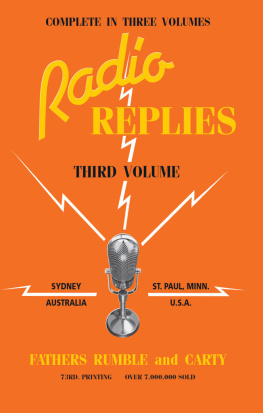


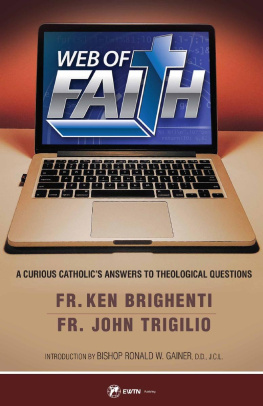
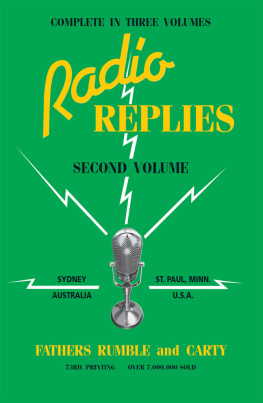
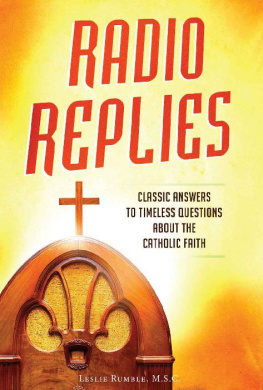
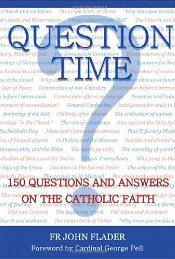
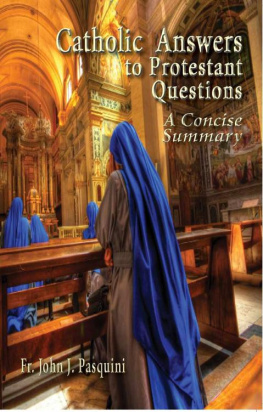
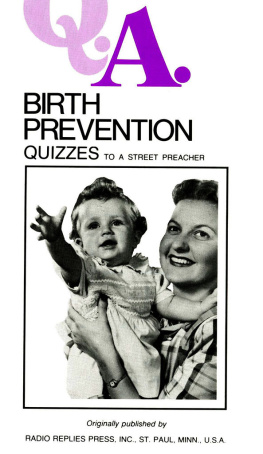
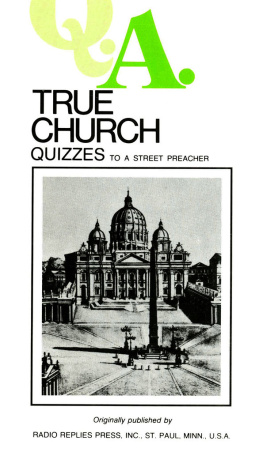

 John Gregory Murray
John Gregory Murray